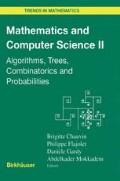Abstract
The main substance of the paper concerns growth rate and classification (ergodicity, transience) of a family of random trees. In the basic model new edges appear according to a Poisson process of parameter A and leaves can be deleted at a rate μ. The main results lay the stress on the famous number e. A complete classification of the process is given in terms of the intensity factor ρ=λ/μ: it is ergodic if ρ ≤ e−1and transient if ρ > e−1. There is a phase transition phenomenon: the usual region of null recurrence (in the parameter space) here does not exist. This fact is rare for countable Markov chains with exponentially distributed jumps A theorem, much of ergodic type is derived for the height of the tree at time t, which in the transient case is shown to grow linearly as t → ∞, at a rate explicitly computed.
Access this chapter
Tax calculation will be finalised at checkout
Purchases are for personal use only
Preview
Unable to display preview. Download preview PDF.
References
H. Cartan (1977) Cours de calcul différentiel Hermann, Collection Méthodes.
F. Delcoigne and G. Fayolle (1999) Thermodynamical limit and propagation of chaos in polling systems Markov Processes and Related Fields, 5 (1), pp. 89–124.
L. Devroye (1987) Branching processes in the analysis of the height of trees Acta Informatica, 24, pp. 277–298.
W. Feller (1971) An Introduction to Probability Theory and its Applications Vol. I and II, Wiley.
B. A Fuchs and V. I. Levin (1961) Functions of a Complex Variable Vol.II Pergamon Press.
I.S. Gradshteyn and I.M Ryzhik (1980) Table of Integrals Series and Products Academic Press, corrected and enlarged edition.
O. Kallenberg (2001) Foundations of Modern Probability Springer, Probability and its Applications.
M. Krikun (2000) Height of a random tree Markov Processes and Related Fields, 6 (2), pp. 135–146.
H. M. Mahmoud (1992) Evolution of Random Search Trees Wiley Inter-sciences. Series.
B. Pittel (1994) Note on the heights of random recursive trees and random m-ary search trees Random Struct. Algorithms, 5, pp. 337–347.
Author information
Authors and Affiliations
Editor information
Editors and Affiliations
Rights and permissions
Copyright information
© 2002 Springer Basel AG
About this paper
Cite this paper
Fayolle, G., Krikun, M. (2002). Growth Rate and Ergodicity Conditions for a Class of Random Trees. In: Chauvin, B., Flajolet, P., Gardy, D., Mokkadem, A. (eds) Mathematics and Computer Science II. Trends in Mathematics. Birkhäuser, Basel. https://doi.org/10.1007/978-3-0348-8211-8_23
Download citation
DOI: https://doi.org/10.1007/978-3-0348-8211-8_23
Publisher Name: Birkhäuser, Basel
Print ISBN: 978-3-0348-9475-3
Online ISBN: 978-3-0348-8211-8
eBook Packages: Springer Book Archive

